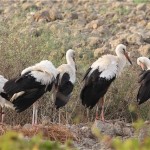BirdLife Malta welcomes the European Commission’s decision to refer Malta to the European Court of Justice over its finch trapping derogation.
Finch trapping is generally prohibited under EU law and when Malta joined the EU in 2004, phasing out finch trapping was one of the conditions of the accession treaty. However, the Government reintroduced the contentious practice in 2014.
Seven species of finches are trapped, including goldfinches and chaffinches, and the birds kept as decoys for use on trapping sites or kept in small cages.
The EC issued a preliminary warning on 16 October 2014, four days prior to the start of the finch-trapping season. The second formal warning, a reasoned opinion, was issued on 28 May 2015, in which Malta was given two months to regularise its position.
Conservation Manager Nicholas Barbara said, “BirdLife Malta applauds the Commission for not hesitating to intervene in the breach of EU laws to stop the suffering and pointless trapping of wild protected birds that the Maltese government has permitted, ignoring several warnings from the EC”.
BirdLife Malta is seeking clarification from the European Commission on whether they will apply an ‘interim measure’ to prevent finch trapping from taking place while a hearing at the ECJ is pending.
Nicholas Barbara added, “An interim measure would mean the government would be forced to suspend finch trapping until the case is heard, preventing the opening of the finch trapping season, which is due to start on October 20th”.
The Maltese government continues to allow trapping of Golden Plover and Song Thrush with a separate derogation on which it has received two official warnings so far, meaning a third warning would bring Malta to the ECJ as well.
“If a trapping season is to be opened this autumn for Golden Plover and Song Thrush, it is likely to be used as a cover for finch trapping. Our data from field surveillance in the 2012 and 2013 trapping seasons, show that 70% of sites were actually used to trap finches” concluded Barbara.



